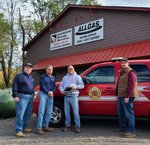NEW YORK CITY — Three days before Thanksgiving 2019, New York City Mayor Bill de Blasio (D) signed into law a ban on the sale of foie gras in New York City, effective date: November 29, 2022. …
Stay informed about your community and support local independent journalism.
Subscribe to The River Reporter today. click here
This item is available in full to subscribers.
Please log in to continue |





NEW YORK CITY — Three days before Thanksgiving 2019, New York City Mayor Bill de Blasio (D) signed into law a ban on the sale of foie gras in New York City, effective date: November 29, 2022. At his side was New York City councilwoman Carlina Rivera (D-Manhattan), who spearheaded the bill in the city council. America’s biggest foie gras market was officially on the chopping block, sending shock waves through Sullivan County. Hudson Valley Foie Gras (HVFG) and La Belle Farms, located in Ferndale, are two of the county’s most lucrative businesses and the nation’s biggest foie gras farms.
Broome County’s assemblywoman, Donna Lupardo (D-123), chairs the state Assembly agriculture committee. “We have workers at risk in a county that has financial and economic challenges—but it’s not just the jobs; it’s the feed companies, the mills, the charitable organizations they sponsor,” Lupardo said. “It’s the role they play in the whole ecosystem that surrounds Sullivan County.”
Leading up to the ban, on June 18, 2019, more than a hundred farmworkers and supporting business owners drove four hours round trip to Manhattan, to make their case for Hudson Valley, La Belle and Sullivan County before the city council. Sean Brooks, founder and owner of Prestige Towing, made the trip to the hearing. Brooks has owned Prestige for 30 years.
“I went to city hall. I went to this meeting of the New York City council,” Brooks said. “They had zero interest in listening to myself or anyone else that was not in favor of the foie gras ban. I remember watching their faces and how intrigued the council members were when someone spoke in favor of the ban but when someone spoke against it, they would get up and walk away.”
According to Sergio Saravia, co-owner of La Belle Farms, “Sean Brooks, the others—they spoke about the impact the foie gras ban would have on their businesses and the council did not want to hear it.” And it wasn’t just the businessmen. The council turned a deaf ear to the workers, too.
Like Sean Brooks, Jesus Ponce traveled to Manhattan to plead his case. Ponce, who grew up in Jalisco, Mexico, has worked at Hudson Valley since its doors first opened under the name Commonwealth in 1981. At first, he worked in the hatchery and artificially inseminated the ducks; later he worked in transportation and at the on-site water waste facility. “I treat the water. It’s a very complicated job. It’s important that the water comes out clean to the brook. Otherwise, we get cited,” Ponce says. “I am very happy with my job.”
Ponce, 56, makes $18 an hour before overtime and works six days a week. With one daughter in college in Rochester and two younger girls, his job is critical to the health and well-being of his family.
Ponce left Manhattan that day feeling “very disrespected... Why did the New York City Council ignore us? Why did they ignore what we said? Our evidence?”
In an interview, and after hours of testimony from Sullivan County’s workers and members of the business community, Councilwoman Rivera turned her back on Sullivan County, saying to NY1, ”Animal rights and making sure that we have a cruelty-free New York City is definitely a priority of mine.”
“We were on our knees,” said Ponce. “They were very rude.”
“Our farmworkers are hard-working. They can’t afford to take a day off,” said New York state senator Mike Martucci (R-42, Sullivan, Delaware, and Ulster counties). “These farmers, their livelihoods, everything that they own is on the table.”
“This ban will have a terrible, detrimental effect on my business,” said Brooks, who has been servicing trucks and heavy equipment for HVFG and La Belle for the past five years. “The foie gras farms are among the hardest-working people you will find—they have a commitment to their people, their employees. They have a perfect payment history.”
A strong work ethic carries a lot of weight with Brooks. At age 11, he landed his first job, on a farm in Hortonville. He has been working ever since. “I started this business when I was just shy of 20 years old. Now I employ 80 people. We have approximately 40 trucks and 30 rental cars,” said Brooks. “The foie gras farms each do about $250,000 a year in business at Prestige. They’re very significant customers.”
Michael Taylor is seventh-generation Sullivan County on his mother’s side. He runs Combined Energy Services (CES) in Monticello, a company opened by his father in 1968. Taylor sells furnaces and replaces boilers, distributes propane and heating oil. He installed and maintains the giant propane tanks that keep HVFG and La Belle heated and running, including in the duck barns.
Together, Hudson Valley and La Belle spend more than $500,000 on propane at CES each year.
Taylor already feels the heat from the ban. “We’re going to be losing a tremendous amount of sales from all the propane gas that they consume.
“And it’s not just CES. A huge amount of money flows through the duck farms,” he said. “They buy all sorts of gas and parts for their equipment and welding and dry ice for shipping their end product. We’re just one little tiny piece of their puzzle.”
“We have a huge economic impact in Sullivan County,” said Marcus Henley, vice president of operation at HVFG. “Last year our sales combined with La Belle’s was $50 million. It has been estimated that there’s a three-to-one ripple effect throughout the community. That amounts to $150 million. It’s huge.”
”We have 400 direct workers between the two farms. They have families who depend on them,” Saravia said.
“Our workers are homeowners and renters and taxpayers. They shop at local stores. We provide small farmers with fertilizer and deliver it for free. We do business with Prestige, CES County Petroleum. We buy grain from Cochecton Mills,” Henley said.
“They will all be impacted if we don’t have the business in New York City,” Saravia said.
“The city council needs a wake-up call. They wouldn’t have to walk half a block to find a problem in New York City,” Brooks said. “Why are they taking on the foie gras farmers? The economic damage from the foie gras ban reaches far beyond the farm.”
“This foie gras ban,” said Taylor, “it’s virtue signaling gone amuck.”
In Part Three, “Waiting for Carlina,” the New York City Council—eyes wide shut—legislates beyond its jurisdiction with the proposed foie gras ban, crossing the line into Sullivan County’s barnyards.
Want to catch up on the full story?
Part II: All duck or no dinner
2 comments on this item Please log in to comment by clicking here
Hickory Hank
This is a welcome piece and the plight of workers like Jesus Ponce gives us a real, up-close sense of what's at stake here for low wage workers who live from check to check with families who are dependent on them. This ban is a done deal now so what are these companies doing to stay afloat and keep workers like Ponce in employment?
Wednesday, November 10, 2021 Report this
JohnG
Such a difficult issue. Ms. Demeranville does an excellent job exploring the human repercussions of decisions made far from Sullivan County. Very much looking forward to the next installment.
Thursday, November 11, 2021 Report this